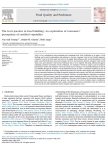Truong V.A., Conroy D.M., Lang B. (2021). The trust paradox in food labelling: an exploration of consumers' perceptions of certified vegetables. Food Quality and Preference, 01/10/2021, vol. 93, p. 1-11.
https://doi.org/10.1016/j.foodqual.2021.104280
https://doi.org/10.1016/j.foodqual.2021.104280
| Titre : | The trust paradox in food labelling: an exploration of consumers' perceptions of certified vegetables (2021) |
| Auteurs : | V.A. Truong ; D.M. Conroy ; B. Lang |
| Type de document : | Article |
| Dans : | Food Quality and Preference (vol. 93, October 2021) |
| Article en page(s) : | p. 1-11 |
| Langues : | Anglais |
| Langues du résumé : | Anglais |
| Catégories : |
Catégories principales 08 - ALIMENTATION ; 8.7 - Politique de la QualitéThésaurus IAMM PRODUIT ALIMENTAIRE ; PRODUIT AGRICOLE ; LABEL DE QUALITE ; ETIQUETAGE DES PRODUITS ; COMPORTEMENT DU CONSOMMATEUR ; AGRICULTURE BIOLOGIQUE |
| Résumé : | Trust is a key consideration when purchasing and consuming foods. Food certification is an aspect of food labelling, and is used by policymakers and marketers to increase consumers’ trust in food. Equally important, consumers’ trust in the food system and actors in its supply chain influences their overall perceptions of food safety, and which foods they choose and consume. However, the interaction between consumers’ trust in food chain actors, and consumers’ trust in food certification, has yet to be explored. This study addresses this gap by examining consumers’ perception of food certification, two examples of which are organic, and Good Agricultural Practices (GAP), and consumers’ trust in food chain actors. In doing so, we extend the literature on trust in food labelling through the inclusion of social-institutional factors in order to understand variations in trust in food. Data were collected via in-depth, semi-structured interviews and the study employed the social theory of trust as a theoretical framework to guide the analysis. Results show that organic, and GAP food certifications are perceived as a representation of the entire food system. Therefore, its trustworthiness is dependent on consumer perceptions of the food system’s capacity to guarantee organic standards along the entire food chain, which is a manifestation of abstract trust. This study contributes to the trust in food literature by showing that interpersonal trust in food actors, such as retailers or growers, can compensate for a lack of abstract trust in certification. Interpersonal trust is predominantly used to guide consumers’ food choices, particularly in the case where abstract trust in the wider institutional system’s integrity and competence is low. |
| Cote : | Réservé lecteur CIHEAM |
| URL / DOI : | https://doi.org/10.1016/j.foodqual.2021.104280 |







